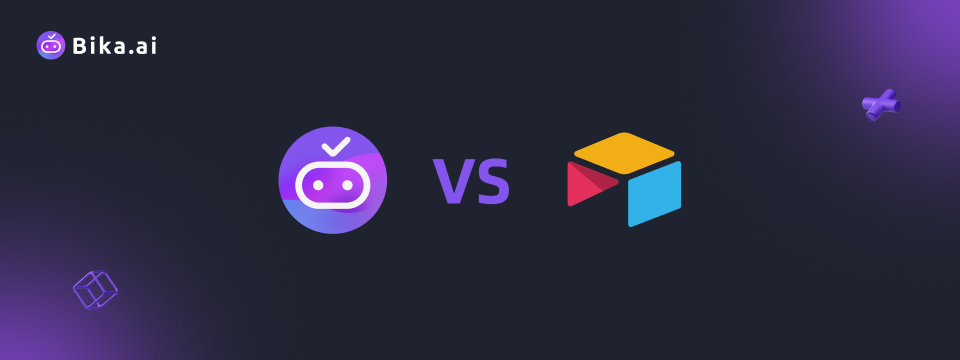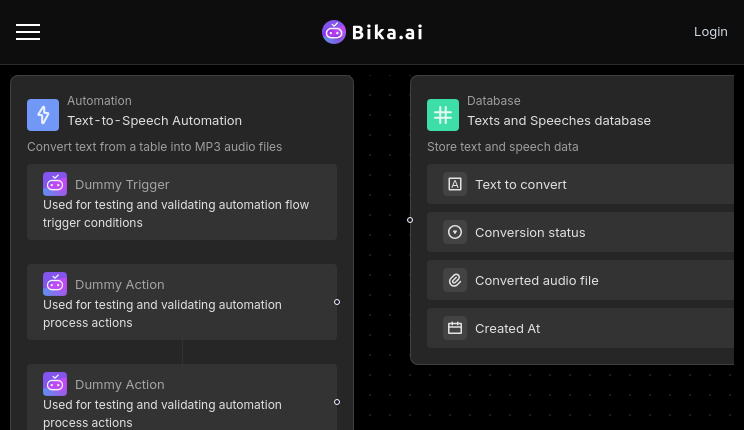
Bika.ai vs Airtable: To Voice assistant integration
The Challenges of Voice Assistant Integration and Emerging Alternatives
Voice assistant integration has become a crucial aspect in modern workflows, but it often presents various challenges. Many turn to established platforms like Airtable to address these issues. However, the emergence of new tools like Bika.ai is changing the game.

Airtable has been a go-to for some, but it comes with its limitations. Its user interface and base structure can be complex for non-tech-savvy users, especially when dealing with large datasets and implementing automation.
Enter Bika.ai. Its Automation Call to Third-Party AI Platform for Text-to-Speech template is specifically designed to overcome these challenges. It offers a more intuitive and accessible solution for those seeking seamless voice assistant integration.
Airtable vs Bika.ai: Key Features At a Glance
Let's take a closer look at how Airtable and Bika.ai stack up against each other in key areas.
| Feature | Airtable | Bika.ai |
|---|---|---|
| Pricing | Free provided, paid plans from $20/user/month | Free provided, paid plans from $9.99/user/month |
| Platform Type | No-code database | No-code AI automation database |
| Ease of Use | Base structure is geeky for non-tech users | Directory tree is easy to use and user-friendly for general users |
| Records per Database | Up to 125,000 records per base for Business plan | Up to 1,500,000 records per database for Team plan |
| Automation | Basic automation capabilities with limited triggers and actions | Advanced automation capabilities with extensive triggers and actions |
| Template | Templates don’t include automation capability; no automation publish and share | plenty of plug-and-play AI automated templates with preset content; supports automation publish and share |
| Storage | 100 GB of attachments per base | 800 GB per space |
| API | Limited APIs | API-first platform making every feature an integration endpoint for automation |
Bika.ai clearly stands out in areas such as handling large data volumes, providing advanced automation capabilities, and offering user-friendly templates.
Bika.ai's Research and Adaptation for Voice Assistant Integration
Bika.ai has conducted in-depth research and gathered practical feedback on the voice assistant integration scenario. This has allowed them to tailor their solution to the specific needs of the audience and the market.

By doing so, Bika.ai helps users improve efficiency and save valuable time. It's not just about having a tool; it's about having a tool that works seamlessly in the context of voice assistant integration.
The Value of Voice Assistant Integration in Team Collaboration
Voice assistant integration can bring significant value to team collaboration. It leads to increased efficiency, saves time, reduces errors, offers customization options, provides convenience, and cuts costs.

Content creators, educators, corporate trainers, and developers can all benefit from this. There are numerous scenarios where Bika.ai's Automation Call to Third-Party AI Platform for Text-to-Speech templates shine, including video narration, podcast scripts, and online courses.
How to Use Bika.ai's Automation Call to Third-Party AI Platform for Text-to-Speech Template
The process is straightforward. This template allows you to automate the process of calling a third-party AI platform API to convert text from a table into an MP3 audio file.
- Step 1: Add the text to be converted to speech in the table, or use the default text provided by the template.
- Step 2: Change the "Status" field of the record to be converted to "Start Conversion". The automation will begin to run.
- Step 3: Wait a moment, and the converted audio file will be uploaded to the record's audio attachment field.
How to Switch From Airtable to Bika.ai
Switching from Airtable to Bika.ai is a simple process:
- Export your data from Airtable in a CSV or Excel format.
- Sign up for Bika.ai and use its data import tools to transfer your data.
- Set up your automation templates in Bika.ai to start reaping the benefits of AI automation right away.
It's time to embrace the power of Bika.ai and transform your workflow with seamless voice assistant integration.

Recommend Reading
- AI Data Automation with Bika.ai: Unlocking New Potential for HTTP Monitoring in Tracking user behavior
- Data Automation with Bika.ai: Unlocking New Potential for HTTP Monitoring in Monitoring website uptime
- Airtable Alternative for Content creator: LinkedIn Post Automation
- WeCom Scheduled Notifications: Airtable Alternative to Daily project updates
- Bika.ai vs Airtable: To Tracking project progress
Recommend AI Automation Templates




Coming soon
